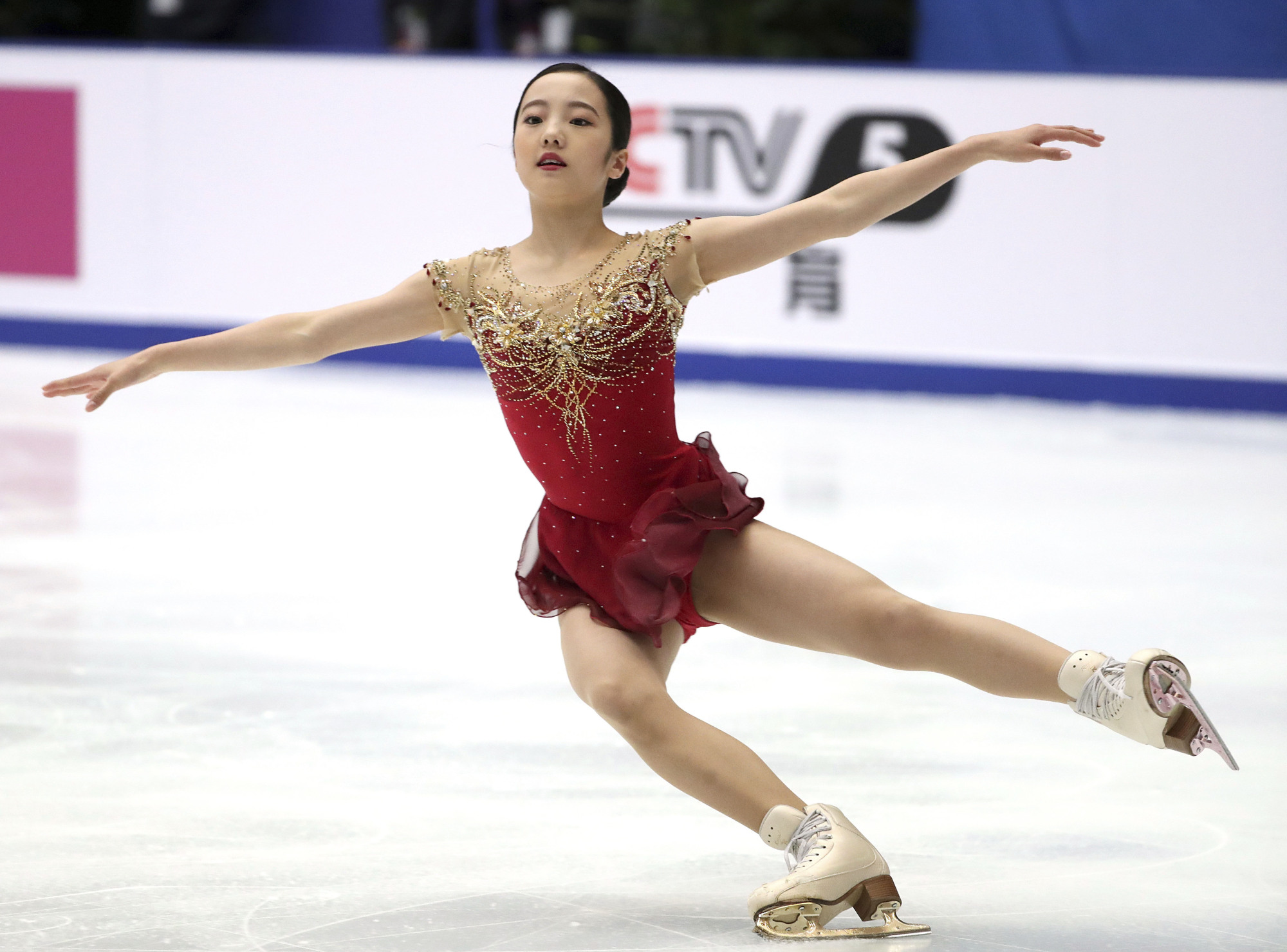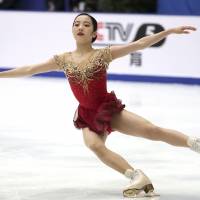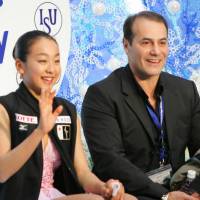Rafael Arutunian is going through a bit of deja vu right now.
Some 12 years after taking on a young Japanese prodigy in Mao Asada, the Armenian coach is doing it again with Marin Honda.
Arutunian, who led Nathan Chen to the world title in March in Milan, Italy, was selected to try and prop up Honda after a lackluster senior debut season, which saw her miss out on the Pyeongchang Olympics.
Ice Time spoke to the 60-year-old Arutunian by telephone on Monday in a wide-ranging interview in which he discussed Honda, Mao Asada, Chen and Evgenia Medvedeva.
"There are a lot of big changes this offseason. It's always like that after the Olympics," Arutunian stated, when asked about how he came to coach Honda at his training base in Lakewood, California.
"As usual, I don't approach anyone. I didn't approach to Mao. I didn't approach to Jeffrey (Buttle)," Arutunian commented. "Somehow they found me and started to talk to me."
Arutunian admitted that Honda, the 2016 world junior champion, had caught his eye over the years at various events.
"I knew her (Marin) from before and saw her at several competitions," Arutunian recalled. "It seems like she is a smart, beautiful girl. She always tries well. We will see what I can do with her."
Arutunian made it clear that he would not agree to take on Honda, who was previously coached by Mie Hamada, unless he was guaranteed two years to work with the Kyoto native.
"I suggested to them that they give me time," Arutunian said. "I know that it takes not less than two years to understand my approach. So they promised to give me two years. I'm hoping they will."
Arutunian had high praise for the 16-year-old Honda in his chat with Ice Time, but said he is waiting to see what changes the ISU has in store ahead of the coming season before determining an exact course of action.
"She is very nice and has good skating skills, good flow. And she jumps well," Arutunian noted. "We will see what will come up with the new system (to be voted on at the ISU Congress in June in Seville, Spain). We don't know the new system yet. We don't know what they will come up with.
"This is why I said I want two years with her," Arutunian added. "Because we don't know what the ISU will come up with."
The work on Honda's programs for the coming season has already begun, Arutunian stated.
"Lori Nichol did her free program already. It's so beautiful," Arutunian commented. "It's something unique. Very unique."
I asked Arutunian if he thought getting Honda out of the media spotlight in Japan might benefit her.
"It was the same thing with Mao," Arutunian remembered. "I think that is why they decided to leave Japan and come to Lake Arrowhead (California). Mao came to the U.S. and tried several places. Then she came back."
Arutunian taught Mao and sister Mai from the summer of 2006 until January 2008.
Working with Arutunian, Mao earned the silver medal at the 2007 worlds in Tokyo, narrowly missing out on the gold to compatriot Miki Ando. Two months after leaving Arutunian, Mao won her first senior world title in Goteborg, Sweden, without a coach.
"I don't know if Marin tried something else. What happened is, she came here the first time and I told them, 'Don't even think about to come right away. You can do a tryout if you like or not. I will see the way you guys work.' They liked it and I really like her a lot."
Ice Time dug deeper to determine how the initial contact from Honda's camp was made to the renowned coach.
After thinking for a moment, Arutunian recalled when it was.
"It was in Osaka (at the NHK Trophy in November)," Arutunian stated. "It was a small conversation with Marin's father. He approached me. I had never met him before.
"They approached me and said they wanted to try out. I said, 'That's a good idea.' I don't want to take on anybody before I know them. I never look around. I'm so busy with my own kids."
After starting the season with a victory at the U.S. Classic in Salt Lake City, in September, Honda's season went south in a hurry. She finished fifth at both Skate Canada and the Cup of China (the week before the NHK Trophy).
It was pretty obvious the alarm bells were ringing in Honda's camp after her Grand Prix results. Matters only got worse at the Japan nationals in December in Tokyo, where Honda finished a distant seventh and looked listless in doing so.
Arutunian believes his previous work with Mao will benefit him in teaching Honda.
"What I see is that I know better how to manage Japanese skaters now," Arutunian stated. "That experience with Mao will help me with Marin."
I inquired about whether Arutunian had his charges work with weights as part of their training programs as Honda, like Satoko Miyahara, doesn't get much lift on her jumps.
"It's not our priority," Arutunian commented. "There are some kids that will build up their muscles, like some juniors. Sometimes we can do that. It depends on when and what period of the season."
Ice Time wanted to know if Arutunian had set goals for Honda for the 2018-19 campaign.
"The goals are very simple. She needs to try to make it to the Grand Prix Final," Arutunian stated. "That should be a goal.
"She needs to try to make the Japanese team for worlds. It's pretty simple. I would say that is the highest goal," Arutunian added. "I would not say she should try to be the national champion. It would be perfect if she can get to the Grand Prix Final."
Honda's mental fortitude has come into question over the past couple of seasons when it seemed at times that she was indifferent to her results.
I wanted to know if Arutunian had any kind of mental training for Honda in his plans.
"I focus on technical and physical, and when they come together, the mental strength shows up," Arutunian commented. "I think this is the way it works for everybody. If you train well, and are physically strong, then sooner or later your mental strength will show up. Sometimes it happens late."
Arutunian then cited one of his own skaters as a reference point.
"Let me give you a very good example in Adam Rippon," Arutunian stated. "You could talk a lot about his mental strength and how he was missing jumps. But whenever he got consistency with his jumps, and his physical shape was perfected, then he skated full programs at the Olympics with zero mistakes.
"He went there with what he had and didn't miss any elements," Arutunian continued. "When you are physically strong and technically strong, the mental strength will start to show up sooner or later."
Arutunian said he insists on having a determined period of time before taking on an elite skater.
"Whenever anybody comes to me, I say to them, 'Can you give me some time? I'm not a magician,' " Arutunian commented. "To make a change in three months or half a year, it's impossible. It's a process.
"I have a team of people that work with me. I talk with them. They help me with all aspects of my job," Arutunian noted. "It means off-ice training, it means skating skills, it means technical stuff. So it all gets together after some time."
Chen's choice a challenge
Ice Time moved on and queried Arutunian about Chen, who will be moving across the U.S. to attend Yale in the fall in New Haven, Connecticut.
"I give everyone the chance to make their own decisions," Arutunian said. "Basically, he was accepted at Yale, which is a very high-level university. I think he is so excited that they accepted him. So he wants to try to skate and study together.
"What he told me is, 'I want to try it.' He doesn't want to leave me, and he knows that I am the coach that basically made him who he is," Arutunian said confidently.
"He wants to try to study and skate, which in my opinion is very, very hard," Arutunian stated. "But this is the only time he can try to do it. He told me, 'Rafael, if it doesn't work, we can do something about it.' He will recalculate his life and start to do what would be necessary. Again, it's his life, not my life."
I asked if Arutunian would be able to work out a bicoastal arrangement where he could work with his prized pupil.
"It would be very hard to do it," Arutunian acknowledged. "It was the same with Mao and Jeffrey. It was difficult. Sometimes Mao wanted me to go to Japan and I said, 'No. I can't do it.'
"Here I have Marin. I have Michal (Brezina). I have (Lim) Eun-soo from Korea," Arutunian remarked. "I have some very good skaters. I will try my best. But it will be difficult."
Right move for Medvedeva
I closed the conversation by wondering what Arutunian thought about Medvedeva, the silver medalist in Pyeongchang, leaving her longtime coach Eteri Tutberidze and possibly moving to Toronto to train with Yuzuru Hanyu under Brian Orser (a move that was confirmed hours later).
"I spoke to the Russian media and told them it was predictable," Arutunian said. "It happens always with skaters from that group of coaches. Whenever they get older and always some younger skaters come, and they kind of leave the coop.
"Compared to (Julia) Lipnitskaia, I think Evgenia made a better decision by going to Brian," Arutunian stated. "I know he is a very strong coach and has a group of strong coaches around him."
Arutunian thinks adapting to a completely new environment won't be easy for the two-time world champion.
"I know it will be tough for her. Medvedeva comes from a different culture," Arutunian said. "I don't know if she can handle that approach which we now have in the U.S. and Canada, where athletes should be more responsible about what they do compared to what happens in Russia. I hope she can handle it. It won't be easy.
"If she goes to Brian, it will be difficult for both of them," Arutunian commented. "But based on the options she has, that would be the best decision."



















With your current subscription plan you can comment on stories. However, before writing your first comment, please create a display name in the Profile section of your subscriber account page.